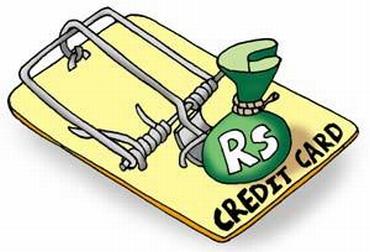
Paying just minimum amount due?
Closed your oldest credit card?
Have never accessed your CIBIL report?
You could be in trouble :-(
From a smart phone to an automobile to a holiday abroad you name anything and it gets easily available to you, thanks to the various credit options available in the market. Sadly, we treat these options as easy money and in course commit certain credit mistakes that ruin our chances of availing further credit.
We all make use of some form of credit -- secured or unsecured. Since last few years our ability of availing and repaying back the loan is being determined by looking at our CIBIL score. More your CIBIL score, the better are your chances to access credit and that too at attractive rates of interest. But while using credit we end up making certain mistakes that can damage our future prospects of borrowing by lowering our CIBIL score.
Here is a list of some common credit mistakes that you must avoid while using credit:
1. Paying only the minimum amount due
Credit card is a kind of debt that allows you to pay minimum amount due every month regardless of your actual bill. So you might think why you should give up more than the required amount.
But paying only a minimum amount due every month is a mistake that you must avoid. The fact is credit card is the most expensive form of debt. So you will eventually end up paying a huge amount in interest if you rollover balance on your credit card every time.
Revolving your credit can and in most cases leads to a debt trap.
2. Utilising higher credit card limits
With increased credit limit many of us go overboard. First of all you should avoid any offers of increased credit limit by the credit card companies. And secondly, you should control your utilisation.
For example, if you have used Rs 70,000 out of a credit limit of Rs 100,000 that takes your utilisation ratio to about 70 per cent. Utilisation of over 30 per cent is viewed negatively by loan providers. Your CIBIL score is also arrived after taking into consideration the credit utilisation ratio of your debt to the available credit limit.
If it’s more, your CIBIL score is negatively affected even if you are making minimum amount due payment every month.
3. Increasing loan tenure for lower payments
In case one is unable to meet up the cost of the EMI, stretching the tenure of the loan seems to be the best possible solution to everyone. Though it seems great but it’s a temporary relief only.
Take a closer look at your expenses to avoid overpaying on your loan by increasing the tenure.
Try to curtail extra costs that are not necessities and meet your EMIs. This will eventually help you to save a considerable amount of money that you would have lost on extra interest payments. Keep increasing your tenure as the last option!
4. Closing your oldest credit card account
The length of your credit history also determines your CIBIL score to an extent and the longer it is, the better it is for your score.
If you cancel your oldest credit card account it would affect your CIBIL score negatively.
You must avoid cancelling your account, especially when it is a clean account with good repayment track record.
5. Not accessing your CIBIL report
Most people assume that they are maintaining good CIBIL score since they make timely payments and hence never access their CIBIL report. But incidences of identity theft are on the rise and someone could apply for a loan on your behalf.
The lenders raise enquiries in your CIBIL report every time a loan or credit card is applied in your name. If you access your CIBIL report from time to time, you would know if the enquiries are genuine or fake.
In case you detect a fake enquiry, you can raise ‘Dispute Request’ by visiting the ‘Dispute Resolution’ page on the CIBIL’s website.
Accessing your CIBIL report once a year is a must!
6. Choosing a credit card only for rewards programme
Credit cards these days come bundled with rewards programme. Though they are enticing they make sense only when you do not carry balance on them.
Otherwise the rising balance along with the interest will far outweigh the benefits that rewards provide.
7. Not reading the fine print of the introductory offers
Credit cards come up with introductory offers like zero per cent or low rate of interest. These offers are enticing and people usually fall for them.
It is important to read the fine print therefore. The tiny text carries a lot of information like when the offer of zero per cent expires and the percentage of interest rate which will be levied thereafter.
In most cases, the introductory rate is for balance transfer amounts or new purchases. But they last only for a certain time frame.
8. Having just one form of credit
While evaluating your loan application, lenders take a look at your CIBIL report and score. You can improve your CIBIL score by maintaining a healthy mix of credit like home loan, auto loan and a couple of credit cards.
If you only have credit cards and personal loans which are unsecured debts, it may affect your chances of any other loan approval since the lenders perceive you as a high risk customer.
Hence, it becomes vital to have a healthy mix of secured and unsecured debts.
If you pay attention to the mistakes mentioned above, credit options can actually prove a boon for you.
Illustration: Utam Ghosh/Rediff.com
The author is a credit expert with 10 years of experience in personal finance and consumer banking industry and another 7 years in credit bureau sector. Rajiv was instrumental in setting up India's first credit bureau, Credit Information Bureau (India) Limited (CIBIL). He has also worked with Citibank, Canara Bank, HDFC Bank, IDBI Bank and Experian in various capacities.









